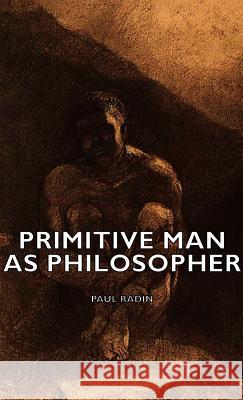Primitive Man As Philosopher » książka
Primitive Man As Philosopher
ISBN-13: 9781443726993 / Angielski / Twarda / 2008 / 432 str.
Primitive Man As Philosopher
ISBN-13: 9781443726993 / Angielski / Twarda / 2008 / 432 str.
(netto: 180,90 VAT: 5%)
Najniższa cena z 30 dni: 188,88
ok. 16-18 dni roboczych.
Darmowa dostawa!
Primitive Man as Philosopher by Paul Radin. Originally published in 1927. PREFACE: When a modern historian desires to study the civilization of any people, he regards it as a necessary preliminary that he divest himself, so far as possible, of all prejudice and bias. He realizes that differences between cultures exist, but he does not feel that it is necessarily a sign of inferiority that a people differs in customs from his own. There seems, how ever, to be a limit to what an historian treats as legitimate difference, a limit not always easy to determine. On the whole it may be said that he very naturally passes the same judgments that the majority of his fellow countrymen do. Hence, if some of the differences between admittedly civilized peoples often call forth unfavorable judgments or even provoke outbursts of horror, how much more must we expect this to be the case where the differences are of so funda mental a nature as those separating us from people whom we have been accustome
Primitive Man as Philosopher by Paul Radin. Originally published in 1927. PREFACE: When a modern historian desires to study the civilization of any people, he regards it as a necessary preliminary that he divest himself, so far as possible, of all prejudice and bias. He realizes that differences between cultures exist, but he does not feel that it is necessarily a sign of inferiority that a people differs in customs from his own. There seems, how ever, to be a limit to what an historian treats as legitimate difference, a limit not always easy to determine. On the whole it may be said that he very naturally passes the same judgments that the majority of his fellow countrymen do. Hence, if some of the differences between admittedly civilized peoples often call forth unfavorable judgments or even provoke outbursts of horror, how much more must we expect this to be the case where the differences are of so funda mental a nature as those separating us from people whom we have been accustome











